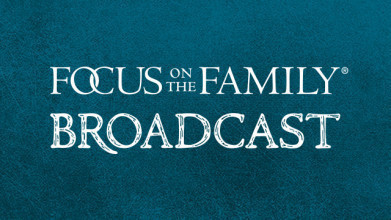Woman: “Tommy, I need you to clean your room or you’ll have to take a time out.” No, that won’t work. He’ll just sit around. “No dessert, no TV, no friends!” Right. And no breakfast, no lunch, no dinner.
John Fuller: Well, I (laughs) I know exactly how that mom feels.
Jim Daly: I tried that once. (laughs)
John: It doesn’t work. Oh my goodness. You want your child to do what they’re supposed to do. Uh, how do you communicate this? How do you get order around everything? It’s hard. And we’re going to be talking about situations like that and so much more in our conversation, our follow up with Dr. Ken Wilgus today on Focus on the Family. Thanks for joining us. I’m John Fuller and your host is Focus president and author, Jim Daly.
Jim: John, this is part two of the conversation. So if people missed part one, go back and get it. You can get it on our website, get the app on your smartphone, and then you have access to the full library.
John: Yep.
Jim: That’s a good way to do it as well. But, uh, yesterday we covered a lot of wonderful content from Dr. Ken Wilgus, a book that he’s written, Feeding the Mouth that Bites You, which basically is how to emancipate your teenagers so they can become successful, strong adults. And that is the goal. Sometimes as parents we tend to want to, uh, kind of put them in a time capsule and leave them at 12.
John: Mm-hmm.
Jim: And (laughs) never mature the relationship. But guess what? You need to and you’re going to be equipped today and last time, to know how to do it.
John: Yeah. Dr. Wilgus, uh, really does such a great job of keeping the end in mind. And so, uh, we’re so glad to have him back. He is a psychologist. He specializes in adolescent behavior. He’s an author and a speaker and a podcast host. He’s been here a number of times on the broadcast. And as you said, Jim, uh, this terrific book that he has we’re making that available to listeners. It’s called Feeding the Mouth that Bites You: A Complete Guide to Parenting Adolescents and Launching Them Into the World.
Jim: (laughs) That’s so good. Ken, welcome back.
Dr. Ken Wilgus: Thanks. Thanks. I’m glad to be here.
Jim: I love it. And again, I said this last time, you really helped Jean and I in our journey of parenting. So I am a fan of the content. Uh, hopefully probably your number one fan. I think Jean has given away, like, 50 of your books.
Ken: Jean is the number one fan… (laughs)
Jim: (laughs)
John: (laughs)
Ken: … just for that.
Jim: So she just, you know, it’s hard to move people. And, uh, every author who puts their ideas into print, you’re hoping for those people that really grab it and apply it and it works.
John: Yeah.
Jim: That’s, that’s what counts, right?
Ken: Yeah. That’s right.
Jim: And I can only attest to the fact that it really worked for us. So wonderful job. And again, great content. Let’s get back into it. Uh, one of the problems you address is how many, uh, parents will discipline their teenagers the same way they did when they were children. Kind of what I’ve been talking about. You know, “I’m going to go at it the same way at 15 as I did when they were eight.” And that’s just a lack of probably energy and focus and thinking it through. Because you need to mature your relationship with the age of your child. And so often I’ll see a, a mom talking to her teenager like an eight year old.
John: (laughs)
Jim: I’m going, “Uh-oh, that’s gotta be really demeaning to the poor kid.”
Ken: Yeah, it is. And if, if there’s anything worse than a, a teenager that doesn’t push back against being demeaned like that, it’s sometimes more and more teenagers that don’t push back, again, about being talked down to like that.
Jim: Yeah.
Ken: That can be almost, their spirit broken enough that they don’t even try anymore. So, yeah, it’s, it’s not good. It does not prepare them for the adulthood they need to be prepared for.
Jim: So with the thousands of, uh, parents that you’ve helped counsel, when you see that kind of thing, what, how do you arrest that behavior in the parent and give them something to latch onto to say, “Okay, when I start doing that, you gotta move off of that eight-year-old attempt and get it back to the 15 year old”?
Ken: It really depends on the parent. So one group of parents that re- that have a hard time with this is very nurturing mothers.
Jim: (laughs)
Ken: Because that kind of talk is sweet. It’s just trying to be helpful and there’s a way of almost, like, having an accent, you can’t even hear it.
Jim: Mm-hmm.
Ken: And, and, but I’ve, you know, the moms that come to me, uh, want to do this. You know, they get it intellectually, but in their heart it can feel wrong. Uh, “I’m not going to just let him go out there and not remind him to this and this and this.” That’s unloving. But you have to add in a- another part of how you hear things, which is what you’re talking. A lot of dads are a little better at hearing the respect part. It’s not about being loving or unloving. It’s about being respectful of the fact that at this stage of life, that’s not going to be, uh, helpful in their preparation as an adult.
Jim: Uh, laying the foundation for this discussion today, let me ask this question. And I didn’t have the experience of having girls. So John, you guys need to jump in. But I’ve seen that. Do you see, with your counseling, do you see certain regularities with, like, mom and sons and then dads and daughters?
Ken: Oh, yes.
Jim: And speak to that. I know we’re not even supposed to bring up the gender issue, but hey, guess what? We’re boys and girls.
Ken: It’d be foolish.
Jim: (laughs) So…
Ken: Yeah.
Jim: So with those differences, what do you see? And how can you help a dad communicate better with a daughter and a mom with a son?
Ken: So the, the probably the, the straight line to all of the feeding the mouth is about cl- most cleanly is your sons. Uh, daughters are a little bit. They’re always a little harder, uh, a little more complicated.
Jim: A little more complex.
Ken: The issue of complete autonomy and respect is an issue for girls for sure. But it can be more complicated because girls are more focused on connection.
Jim: Mm-hmm.
Ken: The most, the most heated is a mother who was really close to her son when he was little. The boy that would get in and tell her everything and whatever, and he was close to her. And that ironically can be a problem in adolescence because she can say, “Hey, how you doing?” And he thinks she’s in his head and reading his mind, and he’s just all worked up. And it really hurts her feelings. So that kind of intensity is, is ironically one of the more common ones.
Jim: Huh.
Ken: The other probably right behind it is a father and daughter.
Jim: Speak to… So the mom listening that’s having that or maybe the precursor to that right now, how can she translate that into a healthier understanding what’s happening?
Ken: Yeah.
Jim: Because that son is trying to become independent.
Ken: That’s right.
Jim: He’s actually on the natural course, but it creates this friction.
Ken: Well, you know, the, and I’ve, moms have really impressed me in that way. I can remember, I think I’ve even mentioned before years ago, there was a mom who fully got the feeding the mouth stuff, but she was just all about this boy and they were really tight. And I remember one day I’d seen him several sessions and they were in the waiting room and having an argument. So I come out and she goes-
Jim: That’s ter- that’s terrible.
Ken: … “I want to go in with him. I want to come.” I’m like, “Okay.” So she comes in and goes, “I want him to tell me why is he mad at me all the time?” And I turned to her and I said, “We talked about that three weeks ago.” He doesn’t like you.
Jim: (laughs) Oh, gosh.
Ken: And she was like, “Oh, yeah.” But she understood what that meant. Of course, he loved her. They were tight. But it was hard for him to like her maternal stuff. But she laughed because she, she was very smart and she understood that those instincts, as strong as they are, does in itself create a, a tension that isn’t real. And it doesn’t mean that he doesn’t love her.
Jim: You know, and I would think a- as a psychologist, what you’re doing as a Christian who’s a psychologist, it’s really about awareness for everybody. Awareness for the team.
Ken: Right.
Jim: But what I’ve heard from you pretty regularly is it’s that awareness from the parent. That parent tends to be the bigger problem. Now, we as parents don’t like to hear that.
Ken: Yes. Well, we, you know, and I wanna be careful. It’s not that parents are causing the problem, but we do heat things up…
Jim: (laughs)
Ken: … for sure. And, and with, if we’re going to talk about the mom example, it’s another reason why your marriage is critically important. Uh, the, you know, the answer to that mom’s heart that feels rejected by these kids needs to be her husband that’s gone, “Baby, this was great before they showed up and we can be great again.” And he really needs to take a lot of time with her not to, you know, remind her, “Hey, not supposed to do that.” It’s more like, “Hey, I get it. I know how that is for you. And come talk to me, not them, and let’s get through this together.” It’s really helpful to her, uh, because her heart is still going to be struggling even though she understands that, “I need to back up, I need to give respect.”
Jim: Let me, let me delve into that for a minute because I think it’s important to talk about the marital relationship in that way. Moms tend to carry a big burden in that area.
Ken: Oh, in the marriage or in the…
Jim: The, the, in the marriage about the parenting.
Ken: Yeah, absolutely.
Jim: And so moms feel it deeper. They’re more concerned. And I think we as dads, we can give the impression that we’re flippant. We’re not concerned.
Ken: Right.
Jim: Although I think what, if we’re, if there’s some credit due, it’s that we have a bigger picture and, “This isn’t a mountain, it’s a molehill.” We tend not to get stirred up quite like mom might.
Ken: Fathering style is, as I call it, warrior training. From very early, most dads have that sense of, “Well, honey, if we keep doing this, he’s never gonna learn to whatever.” That’s a comment that… We’ve never had these children in us. We don’t know what that’s like.
Jim: Right.
Ken: For mothers, it’s, it’s the nurturing, “I’m gonna provide and take care of.” And those are two needed instincts in the household. Uh, that’s why it’s really important for your marriage to be strong because it can really scare a mother. It can feel like I’m talking to a husband who just doesn’t get it. He keeps saying, “Well, let’s just let them work it out. If he knew and was involved like I am, he wouldn’t say that.” And he needs to do the work of really letting her know, “No, no, no. I, I, tell me again all that you’re concerned about.” And try to prove to her, “I get what you’re saying. Uh, but I also think we need to let go of this.”
Jim: And I think in that regard, the, the key thing there is both are needed. I want to put that in neon.
Ken: That’s exactly right.
Jim: You said it. Because if, if a mom tries to make a mom out of the dad, that’s not good. ‘Cause you’re going to overweight that nurturing. And if a dad tries to make mom a dad, you’re not going to have enough love and nurturing.
Ken: And I’ve couples who do this in reverse.
Jim: Yeah. Oh, yeah.
Ken: I do have, you know, where the, where the mom is much better. She’s like, “Hey. I showed him your book and he’s not sure this is going to be caring for…” And I’m like, “She’s doing it right.”
Jim: Yeah.
Ken: And so it, it’s not always as predictable.
Jim: So moving to practical application, one of the things you say in the book is that you need to become a judge as a parent, not a policeman.
Ken: Yes.
Jim: It’s so easy to be the cop. (laughs)
Ken: Yes.
John: (laughs)
Ken: So feeding them out to bite you is not about backing off and letting your teenager do whatever.
Jim: Right.
Ken: When we talk about the freedoms, parents are like, “Well, you’re just giving over stuff.” Then when we get to the limit setting. A lot of times parents are like, “Well, that’s a little rough.” Because if you say what you m-, if… You need to mean what you say. So if the curfew is, um, you know, 11:99, then at 11:01, some consequence needs to happen. But there’s a huge difference between the kind of idea that I need to make sure my kid is home at 11:00, which you can’t do for a 17-year-old or 16-year-old, but you have a lot of power as a judge.
Remember you own everything that they have, even the shirt on their back. And so a policeman may be the one that texts a hundred times. “Where are you? I thought you said you’d be here.” Whatever. It’s a very weak copy.
Jim: Here’s a ticket. Here’s a ticket.
Ken: “Come on.” And the judge is the one going, “So, it’s too late to even talk about it now. It’s already 11:45. Let’s talk in the morning. This is not going to be good for you.” And, and you lay out clear consequences.
Jim: Yeah. Lose the car…
Ken: Not in a lot of words but do, “I hope it was a good time because you’re grounded for a week.” And make that count. It’s very powerful. You’re a, you’re a judge, not a policeman.
Jim: One of the things that can be really hard is the severity of penalty.
Ken: Yes.
Jim: The responsibility you’re talking about.
Ken: Yes.
Jim: And boy, between a mom and dad, they can be very disparate…
Ken: Yes, yes.
Jim: … application like, you know, you’re grounded for a month.
Ken: Yes.
Jim: Well, I was thinking three days.
Ken: Yes.
Jim: H- how do you negotiate that before you get into the arena with your teenagers so you’re both on the same page?
Ken: You start by negotiating as married people not co-parents.
Jim: Yeah.
Ken: So the dad starts by saying, “Honey, that seems like a lot to me. Can you tell me what you, what would scare you if we were to drop it to a week?” And then she would say, because husbands love to hear it, “But, but honey, if that’s what you think we should do, I want to respect your part of it.” And you, so he shows that kind of love and connection to her. She shows respect to him and they come together in finding that. Uh, again, it’s the most common is a dad’s going to say, “Well, that’s a long time.” And a mom’s going to think, “You don’t get it. You’re not really seeing this.” And he needs to prove to her, “Wait a minute. Isn’t, aren’t you concerned?” And if she hears her feelings coming out of his mouth, it’s very comforting.
Jim: I, uh, so the curfew one is so funny and close to home. So Trent, you know…
Ken: Yeah.
Jim: … our oldest. Uh, we had a, I think he was probably 16 or 17, so midnight was the curfew and I remember (laughs) I had this dialogue with him. And he’s so science driven. And I said, you know, nothing good happens after midnight. And he goes, “Do you have data to support that?” (laughs)
John: (laughs)
Ken: (laughs)
Jim: And I was like…
Ken: That’s a great, that’s, that’s a great comeback.
Jim: … “No, but I think it’s true.” (laughs)
Ken: Anecdotally. (laughs)
Jim: He was so straight-faced about it. “You got data that supports that? I don’t know if that’s accurate.”
Ken: There are some wonderful things that happen after midnight.
Jim: (laughs)
Ken: That’s good.
Jim: But it’s still true.
Ken: Yeah.
Jim: So parents, keep on using that one.
John: Yeah.
Ken: (laughs) No, that’s, that’s definitely in the, “I don’t remember anything you said Daddy,” that my daughter told me.
John: Yeah. This is Focus on the Family with Jim Daly and our guest is Dr. Ken Wilgus, who has been here a number of times. We can’t cover this enough it seems, Jim.
Jim: Yeah. (laughs)
John: There is-
Jim: So much good stuff here.
John: Uh, Dr. Wilgus has a terrific book, he’s referred to it, Feeding the Mouth that Bites You: A Complete Guide to Parenting Adolescents and Launching Them Into the World. We want to launch our kids well. Get a copy of this book and do a deep dive on this content. Uh, share a copy with a friend who might need it. Our number is 800, the letter A, and the word FAMILY. Or stop by focusonthefamily.com/broadcast.
Jim: Ken, you mention this. I want to tap this again. You urge parents to create an expectations and consequence list.
Ken: Right.
Jim: So let’s kind of use that a- as an example. What does it look like and how is it different from a contract, let’s say?
Ken: Yes.
Jim: I love the contract.
Ken: Yes.
Jim: They’re never-
Ken: Contracts. Parents always tell me, “We had a contract and, and he signed it, but guess what? He’s not following it.” Yeah, it’s…
Jim: “Therefore, we’re taking him to court.”
Ken: Yeah. Yeah.
Jim: (laughs) It ain’t going to happen.
Ken: There was actually a story of that in New York, but that’s not important.
Jim: Yeah.
Ken: The thing is that, um, you want to be clear that… It kind of mixes the two when you try to be, uh, “Let’s be understanding, come to agreement.” And that’s not ineffective, but often it’s, where it loses effectiveness is that it’s blending two things. The teenager doesn’t want to know when are you, “Are you going to allow me to do this?” It’s, there’s a constant understated or underlying fear that, “When are you going to leave me alone and let me do this?”
Jim: (laughs) Right.
Ken: So the freedoms list is the first list that you put together, then the expectations and consequences list. Once you have that freedoms list, you don’t have to kind of kid around of expectations consequences is, “These are the things we expect.” Put in clear language. And this is what we promise we will do to you if you do not do it. So it’s the, it’s not an agreement, uh, as much as a way to trust that we will not do more than this. But this will be the consequence. “If you don’t get your food, if you have food in your room after we’ve told you can’t, it’s a dollar for every plate, cup. And, and that’s it. We’ll just do that.” But you, you know, it’s a promise that, “This is what we expect. Here’s what we’re gonna do.
Jim: That’s what I was going to ask you an example. So the freedom is you can certainly eat in your room, but the consequences is, the expectation is the dishes never stay in the room.
Ken: Or at the very least, yeah, I have no problem with you can eat in your room.
Jim: Yeah.
Ken: If, if I find it, um, and again, here’s what the consequence will be.
Jim: Now, how granular do you drive that list? I mean, the freedoms, is that a list of 12 things typically or 20 or…
Ken: It, it grows with age so that by the end of pretty much high school, everyone listening, it’s the end of high school that you don’t actually have control.
Jim: Right.
Ken: Um, so by that point you want to have moved everything that’s on the expectations list over to freedoms.
Jim: Yeah.
Ken: Uh, you, you may not be welcome in my home if you’re going to live like that, but, um, you know, the, we’re not making you do anything anymore.
Jim: So both of those lists are shortening by their senior year in high school?
Ken: That’s, well, the freedoms list increases. So for my kids-
Jim: Freedoms increase and the other-
Ken: … their 13th birthday…
Jim: Yeah.
Ken: … they got the freedom to, “Keep your room however you want.” Um, they had the freedom to listen to whatever music they want, because again, these are things we didn’t really have good control over.
Jim: Now, you know, parents are gasping right now when they hear that.
Ken: Oh, especially the room one.
Jim: Yeah.
Ken: I have photos.
Jim: Room and music.
Ken: This musi- this me…
Jim: (laughs)
Ken: Well, the music, the best part about music is that, as I always mention, that’s changed even in the 30 years I’ve been doing this.
Jim: Yeah.
Ken: There used to be these plastic things called CDs, people don’t, probably don’t even remember that.
Jim: (laughs) It gave us more control as parents.
Ken: (laughs) That’s exactly right. You did. But now you just don’t. If you look on the YouTube of a popular song, it will have some billion listens. That’s how it’s being… It’s just, if you have internet, you can listen. It’s ineffective. But to say, um, “Look, we get it. I wish we could control it, but we can’t. You have to make your own decisions about that.” And there’s limits with it. Like, if I catch your little sister listening to it, then you’re gonna lose your phone for a day. You can do that, but by being up front, that’s a freedom, it gives you the, uh, more flexibility in communicating. But if it’s a thing we’ve said that you cannot, then, again, those are the, like, phones now are the thing that comes up all the time. You will have a set limit on the phone. You’ll wake up three weeks later and go, “Hey, we’re not doing that thing we said, clean it off, like, cl- dust off home plate again and set the limit that these things have to be on the charger by 9:00,” whatever the thing is.
Jim: Yeah. Not in your room.
Ken: And, and if not, here’s the consequence. And, and, that goes down easier if you’ve had those, those freedoms that you’re giving and being able to communicate about it. And don’t be surprised that your teenager is so upset that you’re still making me bring this phone down because their thought is you should have nothing to do with this. This is up to me. And our thought is, “Uh, that’s not even your phone.”
Jim: Yeah, (laughs) let’s start there.
Ken: And so, uh, we agree to disagree, uh, but you’re, you know, you didn’t have it down when we told you to. So here’s the consequence.
Jim: Right. And it can create so much friction…
Ken: Yes.
Jim: … in the relationship.
Ken: Yeah.
Jim: But, really sticking to the principles is really important.
Ken: Yeah.
Jim: So your kids… Again, you’re trying to equip them to have good discernment and to learn and that’s the goal. Uh, whenever we talk about rules and enforcing consequences with teenagers like we are right now the issue of disrespect comes up because teenagers maybe aren’t expressing themselves all that well.
Ken: Right, right.
Jim: And so it comes out as this, “Yeah, whatever.”
Ken: Right.
Jim: I remember (laughs) the first time, Troy, he gave me the WE with his hand.
Ken: No. (laughs)
Jim: You know, like WE.
Ken: You have to keep up with these things.
Jim: And I was like, “What does that mean?” He goes, “Dad, come on, it’s whatever.”
Ken: (laughs)
Jim: I’m like, “Oh, okay.”
John: (laughs)
Jim: That was so slow.
Ken: Did you make a rule over that? No whatevers?
Jim: No. And it wasn’t even… Troy just doesn’t have a disrespectful bone in his body, but he was just…
Ken: Right.
Jim: … kind of getting me caught up to the lingo. Whatever.
Ken: Well, parents are kind of on two different ends of that. There are some parents that I have to advise, “You want to be careful that you don’t accidentally make a rule that says you can’t be real mad at me for no good reason.”
Jim: (laughs)
Ken: So tone of voice, yelling. If you’re married, you know that yelling is a quite a subjective thing. “I’m not yelling. Yes, I am.” So you want to be careful to be clear on what we mean by disrespect is. Calling us names, cursing, uh, being, um, giving direct threats. You be real clear on what that is and what it’s not.
Jim: Yeah. That’s a big one. I remember, you know, Trent is 6’7, and I remember he was probably a senior in high school. And he said something, was a little snappy at Jean and I jumped up in front of him at 6’2 going, “Hey, you don’t talk to…” And of course I’m looking up.
Ken: Yeah.
Jim: “You don’t talk to your mother like that.” And he’s looking down at me going. “What are you gonna do?”
Ken: Yeah.
Jim: (laughs) I mean it’s kind of, and to his credit, he de-escalated probably better than I did frankly.
John: (laughs)
Ken: Yeah.
Jim: But it worked, uh, but y- that’s l-
Ken: But that’s limited.
Jim: Exactly. (laughs)
Ken: Because some other parent, ironically I have more parents now that because he’s upset, “Yeah, he drops F bombs all the time and wh-” I’m like wait, he didn’t, he knows he can’t do that at school. So you can have a rule, uh, with a reasonable consequence.
Jim: Absolutely.
Ken: You know, not huge, it’s not nice, but it’s a fine. It’s another dollar. “Do you want to calm down, dude? I think you’re losing money fast.”
Jim: Yeah.
Ken: But being specific so that you don’t either have a rule that says, “You can’t be mad at me,” or the other end, which is, “Well, if you’re mad, then we don’t have any limits because we know you can’t control yourself.” That’s not true.
Jim: I could hear you saying, but correct me if I’m wrong, you know, “Being mad at me is okay. But lashing out or being deeply disrespectful-”
Ken: That’s right.
Jim: “… is never okay.”
Ken: Yeah. Well, as y-
Jim: “I shouldn’t do that to you and you shouldn’t do that to me.”
Ken: So you said, this is stupid and I don’t agree with you, but you said I’m stupid and that’s going to cost you a buck.
Jim: (laughs)
Ken: So, so there’s a line of, it’s sort of like how you would talk to a boss that you’re pretty close to. You, you get along well and, you know, and then you, but there’s, there’s a point where, “Hey, wait. I’m still your boss. You can’t talk to me like that.”
Jim: Yeah let’s, let’s get into the house rules list. This is something we have on our wall. (laughs)
Ken: Not now.
Jim: House rules.
Ken: Oh, it’s for you? Jean has it for you?
Jim: It may still be hanging up in the basement.
Ken: That’s probably it. (laughs)
John: (laughs)
Jim: But it definitely was there for a while. And it was a great list by the way. We bought it at some great bookstore-
Ken: I’m sure it was.
Jim: … like Focus on the Family bookstore. (laughs)
Ken: That’s a great store by the way.
Jim: And, you know, it had a dozen things. We treat each other with respect and all those wonderful things. H- how do we inculcate house rules with maybe not having to hang them on the wall? I, I guess what’s your philosophy about that?
Ken: So, like-
Jim: Some people say house rules really aren’t effective.
Ken: I think with children, it’s great. I think you can do this.
Jim: Yeah, like younger kids?
Ken: Absolutely.
Jim: Six, seven, eight, nine.
Ken: “This is what you do. I check-”
Jim: Yeah.
Ken: “… when you do.” You can even add rewards if you do it. I thi- I think up to 12, go nuts. The question is, does it change in effectiveness with teenagers? Yeah, it really does. So you do better to clarify an area of control. “You have to have this vacuumed by Tuesdays and Fridays. Uh, you have to do the, uh, empty the dishwasher every Monday, Wednesday, Friday.” Something very clear and a consequence if you don’t. But, but less of the, um, tracking it as much. You, you want to basically just be able to check by bedtime so that you can say, “Hey, I, the dishwasher is still not empty, so you lost five bucks and if it’s not done by the time you leave for school, you’re going to lose your phone.” Something that, again, you’re not, um, you definitely, the, the implied rewards for teenager is, “Leave me alone.” Not a pizza party at the end of the week.
Jim: (laughs)
Ken: That’s not a… But being clear about that, “I need you to do this.” And not being surprised if your teenager doesn’t want to. What kind of a 16-year-old just eats his food and walks away and doesn’t even think about his dishes? Lots of 16 year olds, you know?
Jim: Yeah.
Ken: It’s, it’s not unusual. You put a rule. “You have to do this. And if you don’t there’s a consequence.”
Jim: Ken, when you, uh, right at the end, the time passes so fast but when you look at all the parents you’ve counseled with their teens what is that story or maybe a couple stories where even in your own mind you’re going, “This is gonna be tough,” but it worked. Describe a scenario like that.
Ken: I have tons of those.
Jim: Yeah.
Ken: I remember talking to a guy who, uh, came to see me years later, I’d worked through with his teenagers. And he was wanting to consult about a career change. But I asked, “Hey, how’s, how’s your daughter? How’s your son?” And he’s like, “Oh, they’re great. We’re going to see them, um, you know, with… One of them has grandchild,” and all this. And, and I said, “Remember when you were pretty sure ev- everything was just going to go off a cliff?” And he was like, “Yeah, there really isn’t a cliff, is there?” I said, no, it’s, there’s rapids and you go through it and then you end up on the other side. And, and-
Jim: But do you, (laughs) end up on the other side upside down or right side up?
Ken: I, almost always right side up.
Jim: Good. Good to hear.
Ken: But it does make a difference that, you know, they had, uh, backed up, not panicked, s- clarified what they were really had limits on, and clarified, and this was the harder part because there was some texting and things that were scary, clarified the things that they’re not requiring. And that calmed everything down. And, and as happens always, their kids turned out better than they thought.
Jim: Yeah.
Ken: You back away, you let your, let your teenagers surprise you with just how well, not like you thought they would, but that they turn out the way that God has always ex- said they would. And it’s not all about whether you did it right.
Jim: I would, there was nothing that we could foresee that, that turned Trent the way that this content did. And it was beautiful to watch.
Ken: Mm-hmm.
Jim: I mean, as soon as we backed down and gave over control, uh, he turned emotionally toward us. In fact, the night I remember, um, Jean had made a wonderful dinner and he went out and he sent her a text saying, “Mom, that was such an awesome meal. Thank you for taking the time to cook it and prepare it for us.”
Ken: What a grown up.
Jim: Oh, I was like, and I remember saying to Jean. Like, “Who is this?”
Ken: Yeah. (laughs)
John: (laughs)
Jim: That was the, that was the day…
Ken: Yes.
Jim: … that it really turned and he hasn’t stopped. I mean, he does that regularly when he comes. Now, when he comes to the house…
Ken: Yeah.
Jim: … and has a great meal…
Ken: Yeah.
Jim: that mom’s made. And it’s just a, a, to me it’s a great testimony…
Ken: Powerful.
Jim: … to what you are asserting in the book. And we give you great credit for that.
Ken: That’s good.
Jim: And, uh, it worked.
Ken: That’s great.
Jim: And so I hope people will catch this. And it is fearful for a parent to give up control. But you know what, it, it is so in alignment with the gospel. Uh, God says, “Choose. You choose me or you don’t have to choose me, but it’s going to go a lot better if you do.” (laughs) And I, I think that’s the same in our own parenting journey.
Ken: It’s true.
Jim: You know, you say to your child, your teenager, “Choose this path or choose that path, but it’s your choice.” And, uh, there’s so much power that comes with that. So, great to have you here the last two days.
Ken: Thanks.
Jim: Thank you so very much. Look forward to more.
Ken: Yeah, good to be here.
Jim: Because it’s so good. And if you would like to really revamp your parenting approach. If you’re in that teen or preteen mode with your kids at home, get a copy of this great resource by Dr. Ken Wilgus, Feeding the Mouth that Bites You. Uh, for a monthly pledge of any amount, we’ll send this book to you. Your ongoing support is really, really key. It enables us to respond to the hundreds of thousands of moms and dads who are looking for practical help to raise good and godly kids. And working together we can meet that need. So sign up for a pledge today or a one-time gift if that’s all you can afford. We understand that and we really appreciate your generosity.
John: Mm-hmm. Yeah. We’re a phone call away. Our number is 800, the letter A, and the word FAMILY, 800-232-6459. Or, uh, just stop by the show notes for all the details about donating and getting a copy of this terrific book by Dr. Ken Wilgus, Feeding the Mouth that Bites You. When you’re at the website, check out our age and stage e-newsletters, which are designed for you. Our parenting team has, uh, compiled hot topics to keep you up to date, along with practical advice and encouragement tailored to the age of your child. Best of all, this resource is free and you can find the link at focusonthefamily.com/broadcast. Well, coming up tomorrow, we’ll examine how pornography is putting far too many marriages at risk.
Mark Makinney: If you are struggling with pornography, what that says about you is this, you are actually in the category of people that Jesus came to save. He said, I did not come to call the righteous to repentance. The well do not need a physician. So, I mean, I know it’s… I’m not minimizing porn use, it’s a bad one. But that’s all it says.
John: On behalf of Jim Daly and the entire team, thanks for joining us for Focus on the Family. I’m John Fuller inviting you back as we once again help you and your family thrive in Christ.




















